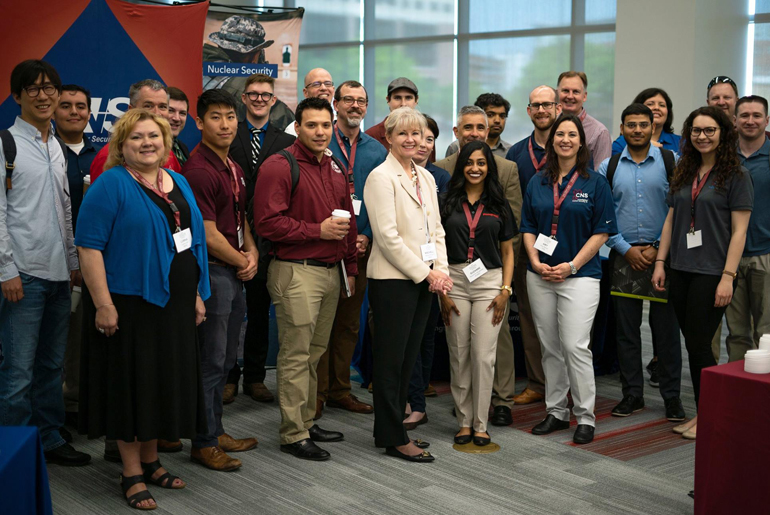
The National Nuclear Security Administration (NNSA) partnered with Texas A&M University to host Nuclear Security Enterprise (NSE) Day on April 8. The event offered attendees the chance to learn about career opportunities and internships for all STEM majors with the NNSA labs, plants, and sites.
Dr. Donna Mischell Navarro, chief human capital officer for the NNSA, welcomed students in her keynote speech and encouraged them to consider a career with the NNSA. She explained that the NSE is made up of the NNSA and its labs, plants and sites. The NNSA maintains and enhances the safety, security and effectiveness of the nation’s nuclear weapons stockpile; reduces global danger from weapons of mass destruction; provides the U.S. Navy with safe and effective nuclear propulsion; and responds to nuclear and radiological emergencies in the United States and abroad.
NSE Day also featured several undergraduate and graduate panel discussions aimed at answering any questions students might have about working within the NSE.
“A career with the NNSA is especially great for undergraduates to consider since the positions are structured in a way to help them build on skill sets they gained during their education,” said Ben Stallwitz ’09, functional manager from the Pantex Plant in Amarillo, Texas. “Many companies will even support employees pursuing master’s and Ph.D. degrees as well.”
Students also had the option to attend a Career Fair as a part of NSE Day to learn more about the critical work these entities perform to protect the nation. “The industry is literally looking to hire thousands of new employees from all kinds of backgrounds,” said Benjamin Grover, division leader from Lawrence Livermore National Laboratory. “The development of nuclear weapons isn’t going away, and there’s no way we can control or predict what other countries will do with that technology. It’s kind of like a Pandora’s Box, and we need to be aware of it all. But that also means we will always need people in this line of work.”
The nuclear industry recognizes the important role academia plays in workforce development, which is why Y12 and the Los Alamos National Laboratory (LANL) have partnered with professors such as Dr. Pavel Tsvetkov, associate professor in the Department of Nuclear Engineering, and Dr. Sunil Chirayath, associate professor and director of TEES’ Center for Nuclear Security Science and Policy Initiatives, to support and fund specialized, focused courses for students.
“The focus of our Nuclear Criticality Safety Program is to prepare future generations of nuclear criticality safety experts for the national labs and industry,” Tsvetkov said. He is teaching a course about criticality safety fundamentals together with experts from LANL and Y12, while Chirayath is teaching a course on the use of Monte Carlo N-Particle Transport Code, a computational tool that is widely used in the nuclear community. The program is currently in its second year and aims to establish a pipeline of nuclear criticality safety engineers to U.S. national laboratories and industry.
Texas A&M is one of only a handful of prestigious universities selected to host an NSE Day event to engage STEM students interested in a career with the NSE.
